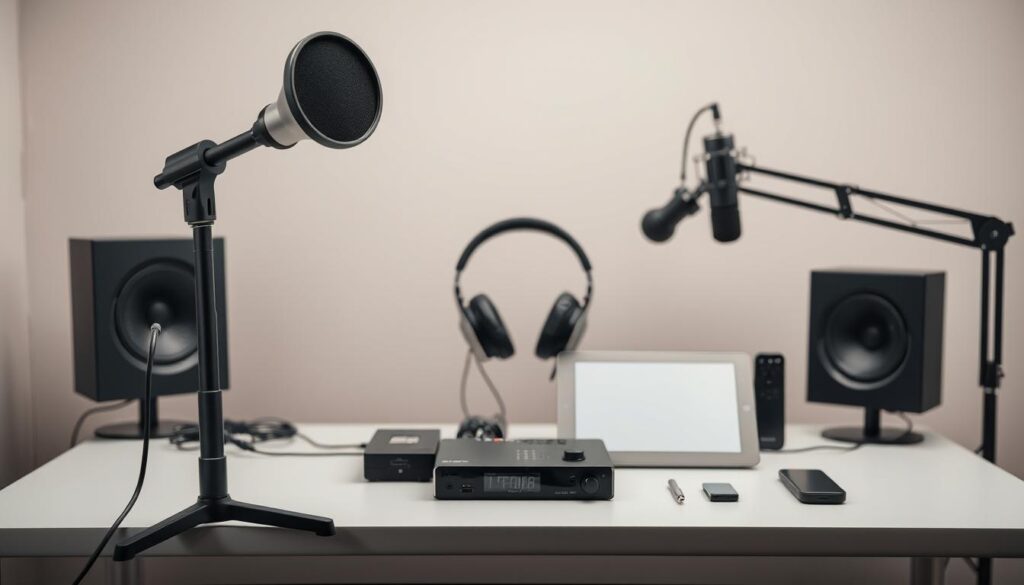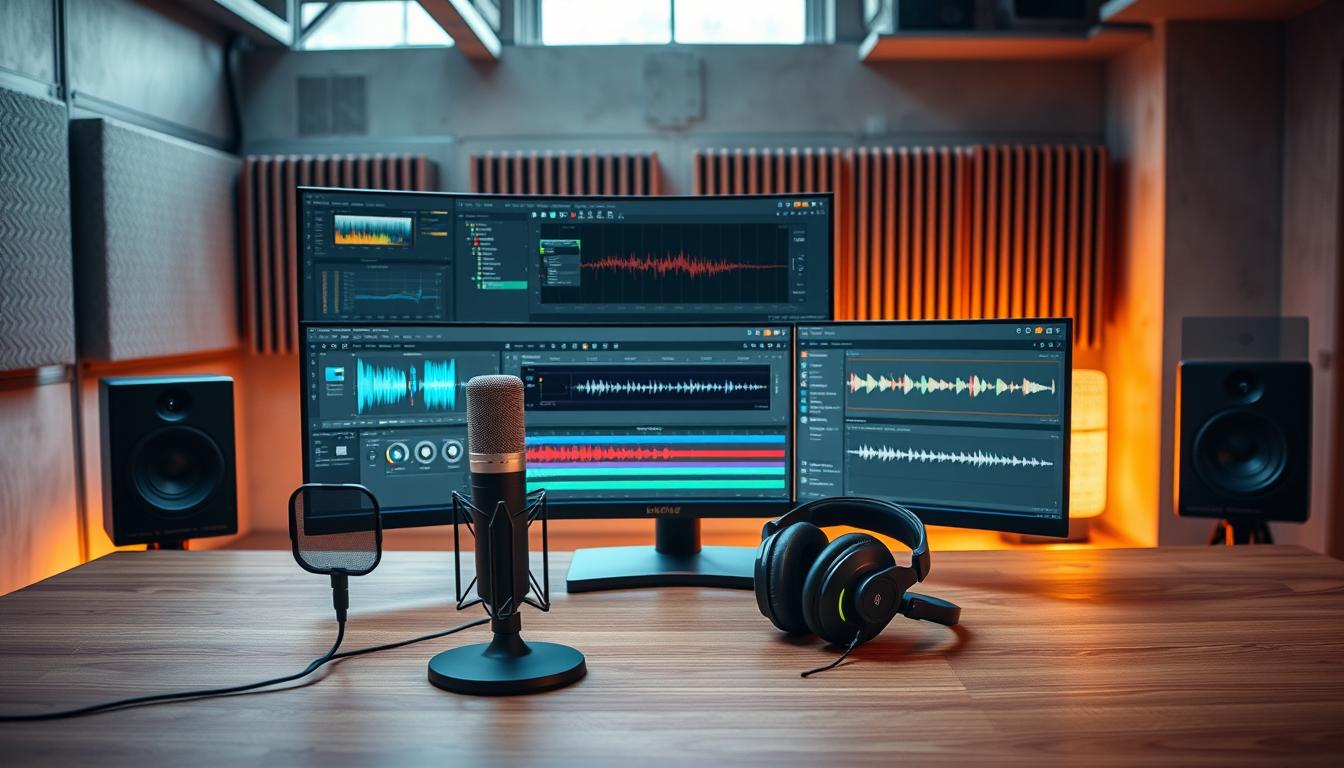I’ve worked with many podcast tools and software as a professional podcast producer. In this article, I’ll share my top picks for the best podcast software in 2024. Choosing the right software can be tough with so many options. I’ll help you find the best podcast software, whether you’re new or experienced.
The best software should offer high-quality audio, be easy to use, and have key features for recording and editing.
Having the right software is key for high-quality podcast episodes. The best software can greatly improve your podcast’s sound and production. We’ll look at the top podcast tools and software, including free and paid options. We’ll cover the best software for recording, editing, or both, for all levels of podcasters.
Key Takeaways
- Choose the right podcast software for your needs and skill level
- Consider the key features you need, such as recording, editing, and effects
- Free and paid options are available, depending on your budget and requirements
- Best podcast software should provide high-quality audio and user-friendly interface
- Podcast tools and software can make a significant difference in the overall sound and production quality of your podcast
- Research and compare different options before making a decision
- Read reviews and ask for recommendations from experienced podcasters
Why Choosing the Right Podcast Software Matters
As a podcaster, I’ve found that picking the right software is key. It affects your podcast’s audio quality, saves editing time, and makes it sound professional. There are many podcast editing apps out there, but not all are the same.
Look for software with audio editing tools, effects, and export options. These features help improve your podcast’s sound, add depth, and make it work on different platforms. The right software lets you focus on making great content, not dealing with tech problems.
- Improved audio quality: The right software can help you achieve professional-sounding audio, with features like noise reduction and equalization.
- Time-saving: With the right tools, you can streamline your editing process, saving you time and effort.
- Professional output: The right software can help you create a polished, professional-sounding podcast that will engage and retain your audience.
Investing in top-notch podcast software can elevate your podcast. It helps you stand out as a credible and professional podcaster. Whether you’re new or upgrading, choosing the right software is crucial for success.
Essential Features of Professional Podcast Software
Creating a top-notch podcast requires the right podcast tools. A professional software should be easy to use, even for podcasting newbies. Look for tools with advanced audio editing, seamless hosting platform integration, and features for team collaboration.
A good podcast editing apps also offers various effects and processing options. These can include noise reduction, equalization, and compression. Some apps even have automated editing, like automatic volume adjustment and noise removal.
Here are some key features to consider when choosing a professional podcast software:
- Advanced audio editing tools
- Seamless integration with popular podcast hosting platforms
- Collaboration features for multiple hosts
- Effects and processing options for audio enhancement
- Automated editing features for ease of use
By looking at these essential features, you can pick the best podcast tools and podcast editing apps. They will help you make a podcast that captivates and educates your listeners.
Top Free Podcast Software Options
Creating a podcast needs the right software. As a podcaster, I’ve tried many best podcast software options. I’m excited to share my findings with you. We’ll look at top free podcast software, like Audacity, GarageBand, and Adobe Audition.
These podcast editing apps have great features for recording, editing, and producing podcasts. They offer multi-track recording, effects, and mixing. Each software has its own strengths and weaknesses. Let’s dive into what each offers.
Feature Comparisons
- Audacity: multi-track recording, effects, and mixing
- GarageBand: user-friendly interface, loops, and effects
- Adobe Audition: professional-grade features, including noise reduction and spectral editing
Limitations to Consider
While these free options are great, they have some limits. Audacity can be too much for beginners. GarageBand is only for Mac users. Adobe Audition has advanced features that require a lot of learning.
Best Uses for Each Option
The best free podcast software for you depends on your needs and preferences. If you’re new, Audacity or GarageBand might be best. For advanced users, Adobe Audition is worth it. Choosing the right best podcast software and podcast editing apps can elevate your podcast. You can create high-quality content that engages your audience.
Premium Podcast Software Worth the Investment
Investing in premium podcast tools can greatly improve your podcast’s quality. The best podcast software has advanced features like multi-track recording and noise reduction. These features can make your podcast sound professional.
Popular premium podcast software includes Pro Tools, Logic Pro, and Ableton Live. These tools offer collaboration features, advanced editing, and top-notch audio processing. Although they cost more, they’re worth it for serious podcasters.
Here are some benefits of using premium podcast software:
- Advanced audio editing tools
- High-quality effects and processing
- Collaboration features for multi-host shows
- Professional-level audio output
Investing in premium podcast software can elevate your podcast. It helps you create engaging content that keeps your audience interested. Whether you’re new or experienced, premium podcast tools and best podcast software can enhance your podcast’s quality and success.
Remote Recording Solutions for Multi-Host Shows
Recording a podcast with multiple hosts needs the right tools. As a podcaster, I’ve found that the best podcast software is key. Look for apps that let you record remotely with many hosts.
Cloud-based options are great for this. Tools like Zoom, Skype, and Google Meet make remote recording easy. They let you connect with co-hosts and guests anywhere. Plus, they have collaborative features for screen sharing, chatting, and recording video.
Using cloud-based options for remote recording has many benefits. Here are a few:
- Easy connectivity with co-hosts and guests
- High-quality audio and video recording
- Collaborative features like screen sharing and chat
- Ability to record from anywhere with a stable internet connection
When picking the best podcast software, think about your internet needs. A fast and stable internet is vital for quality recording. With the right apps and cloud-based options, you can make episodes that grab your audience’s attention.
Best All-in-One Podcast Software Suites
Creating a professional podcast requires the right podcast tools. All-in-one software suites offer many features. They help from recording to editing and publishing. Hindenburg Field Recorder, Ferrite Recording Studio, and Anchor are popular choices.
These podcast editing apps have advanced audio tools. They also work well with popular hosting platforms. This makes it easy for podcasters to focus on quality content.
Look for these key features in an all-in-one software suite:
- Multi-track recording and editing
- Advanced audio effects and processing
- Seamless integration with podcast hosting platforms
- Easy publishing and distribution

Choosing the right software suite saves time and effort. It lets podcasters focus on creating engaging content. Whether you’re new or experienced, these suites can elevate your podcast.
Technical Requirements and System Compatibility
Choosing the right podcast software is key. It must work well on your device, whether it’s a Windows or Mac computer, or even a mobile device. The software should be easy to use and work with different operating systems.
I look for apps that can handle lots of tracks, effects, and plugins without slowing down my computer. For Windows users, a minimum of 4GB RAM and a dual-core processor is recommended. Mac users should have at least 8GB RAM and a quad-core processor. Mobile devices offer convenience but may have less power and storage.
System Requirements Comparison
- Windows: 4GB RAM, dual-core processor, Windows 10 or later
- Mac: 8GB RAM, quad-core processor, macOS High Sierra or later
- Mobile: 2GB RAM, dual-core processor, iOS 12 or later, Android 9 or later
By picking the right software, I can create great content without tech troubles. Whether on a desktop or mobile, the best software should be easy to use and work well with popular platforms.
Advanced Editing Features for Professional Production
As a podcaster, the right podcast tools are crucial for quality episodes. Professional podcast software offers advanced editing features. These include audio clean-up tools, effects, and processing to polish your sound.
Using podcast editing apps with these features saves time and effort. You can remove noise, adjust EQ, and add effects like reverb and compression. This way, you can make your podcast sound professional without needing to be an audio engineer.
Key Editing Features to Look For
- Noise reduction and hum removal
- EQ settings and frequency adjustment
- Reverb and compression effects
- Multi-track editing and mixing
When picking podcast software, check the export options. Look for software that exports in MP3, WAV, and AAC formats. It should also have customizable settings for bitrate, sample rate, and more. With the right podcast tools and podcast editing apps, you can focus on creating great content.
My Personal Software Recommendations by Podcast Type
As a podcaster, I’ve tried many best podcast software options. I found that different podcasts need different tools. For interview-style podcasts, I recommend software with advanced audio editing and collaboration features.
For these podcasts, look for apps with easy interfaces and high-quality audio. This makes your podcast sound great.
For narrative podcasts, focus on storytelling and audio design. These podcasts need complex editing and production. Choose software with lots of effects and collaboration tools for working with hosts or guests.
For educational podcasts, pick software that’s easy to use. It should have features for quizzes, surveys, and tracking listener engagement. This helps make your podcast informative and engaging.
Choosing the right podcast software depends on your needs and goals. Try a few options to find the best one for you. The right software helps you create quality podcasts that connect with your audience.
Tips for Choosing the Right Podcast Software for Your Needs
Choosing the right podcast software is key. It depends on your budget, the type of podcast, and editing needs. Podcast tools differ in features and cost. It’s important to test them before buying.
Here are some tips to help you choose the right podcast software:
- Think about the type of podcast and editing needs
- Consider your budget for free or paid podcast editing apps
- Try out different software to find the best fit for you
By considering these tips and your needs, you can find the perfect software. This will help you create great episodes and grow your audience.
Conclusion: Choosing Your Perfect Podcast Software Solution
Finding the right podcast software is key to making your audio sound great. It also makes your podcasting work easier and more professional. Whether you’re new to podcasting or have been doing it for a while, picking the best software is important.
I recommend Zencastr as the top choice for podcast software. It has great features, makes remote recording easy, and is easy to use. Zencastr is a top choice for making high-quality podcasts.
As you keep making podcasts, look at different best podcast software options. Try out different programs to see which one fits your needs best. Look at their features and how easy they are to use.
Choosing the right podcast editing apps is a personal decision. What works for one person might not work for another. Be open to trying new tools as your podcast grows.
